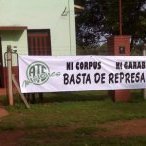
6 August 2012 | Interviews | Water | Climate Justice and Energy
Misiones Without Dams
Resistance to Mega-Dams in Argentina
Download: MP3 (1.1 Mb)
A movement of resistance to the building of massive hydroelectric dams is growing in the Argentinean province of Misiones, in the border with Brazil and Paraguay. These dams would have terrible impacts on the ecosystem, the communities and the local population.
The binational dam of Yacyreta (Argentina-Paraguay) already affects the coast of river Parana in two Argentinean provinces: Misiones and Corrientes, as well as the Paraguayan coast. There are plans to build two more dams in the region: Garabí and Painambí dams. The anti-dam movement organizes the people already affected and those who would potentially be affected by dams.
Real World Radio interviewed Maria Elena Parras, a member of “Misiones Without Dams” an organization that is part of the province’s roundtable to say “NO to dams”. She told us about the problem that the building of these dams is causing in the north of Argentina, as well as the strategies of resistance in the region.
“The province said ’No to dams’ in a referendum held over 16 years ago”, when a popular consultation on the building of Corpus dam on Parana river was carried out, explained Maria Elena.
However, they are still fighting for the implementation of the referendum, “so we want to know why the negotiations continue if we already said no? The discourse is ’we need more energy’ and our first impulse is to say ’no, there are alternatives. The government has to listen to the movements. Instead of investing in feasibility studies for mega-dams they can invest in seeing what energy alternatives are out there”.
Maria Elena also mentioned that the resistance to these mega projects involving transnational corporations is organized by the Latin American Network Against Dams and For Rivers (REDLAR).
On August 8, in Posadas, Misiones’ capital, there will be events including a meeting with the governor and on Thursday 9 there will be actions in Obera, the city that would be worst affected by Garabí and Painambí dams, explained the activist.
Building such massive dams in a tropical region implies the destruction of the fauna and the native plants, as well as an overall impact on the ecosystem, said Maria Elena.
“What concerns me the most is that they would ignore the decision of the communities. We, as environmental activists have no obligation to present alternatives, although we do have them. It is the state’s role”.
Interview by: Friends of the Earth Argentina during a tour around the areas of resistance to dams in the north of Argentina.







